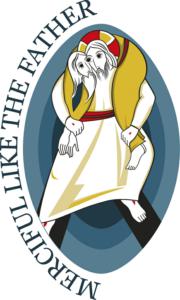'Merciful like the Father'
The Holy Year of Mercy begins on the Solemnity of the Immaculate Conception, Dec. 8, 2015, and will close on Nov. 20, 2016, the Solemnity of Our Lord Jesus Christ King of the Universe. This Jubilee year is extraordinary in many ways. Unlike the jubilees that take place every 25 or 50 years, or the Great Jubilee Year 2000, Pope Francis has proclaimed a jubilee based on a theme -- God's Mercy. He said that this Holy Year of Mercy is a journey, a "journey which begins with spiritual conversion." And we know that conversion is always a response to God's grace, his loving invitation to follow him more closely and more faithfully. This Holy Year of Mercy is an invitation to us from God, who is mercy. It is an invitation for us to be "Merciful like the Father," and to practice the spiritual and corporal works of mercy.
During the Holy Year of Mercy doors are to be opened in the cathedrals of the world, doors of mercy. On Dec. 8, the first Holy Door will be opened by Pope Francis at St. Peter's Basilica in Rome. On the following Sunday, Dec. 13, doors of mercy will be opened at cathedrals throughout the world, including our own Cathedral of the Holy Cross. This Door of Mercy will be open throughout the Holy Year of Mercy for pilgrims to enter the Cathedral, which is a house of mercy. God dwells here in his sacraments and in his Word. He can be found in his body, the Church, which exists to glorify him and to lead others to a merciful encounter with God.
You may be asking, "What is a Door of Mercy for?" Each day we pass through many doors: in our homes, our automobiles, our places of work and recreation. Most of the time we are simply passing through, in and out, without even thinking about the door. A Holy Door is different. Rather than just simply passing through this door, it exists to help us "pass over," to experience the grace of conversion, a significant change in the direction of our lives.
God has been opening doors throughout all of history: He opened the door of Noah's Ark, to save mankind from the waters of the flood (Genesis 6:16); the doorposts of the houses of the Israelites, to free them from slavery (Exodus 12:22); the door of the Temple in Jerusalem, to enter into God's glory and worship (Ezekiel 43:4); the prison door of Peter's cell, to save him from impending death. All these moments in the Bible point to the truth that Jesus himself is the door to our salvation. Christ said, "I am the door" (John 10:9). The wood of the cross was watered by the Blood of Christ and burst forth as the Tree of Life. When Christ opened wide his arms on the cross, he opened the door to our salvation. When his disciples went to the tomb on Easter morning, they found an open door -- the stone had been rolled away.
During this Holy Year of Mercy God invites us not simply to pass through a door, but to "pass-over" from sin to mercy, from darkness to light, from isolation to communion with God and his Church. When we "pass-over" this threshold, we encounter Christ who is the merciful face of the Father. Just as when we turn the door knob in order to enter the door of a house or a room, when we enter the Holy Door it is Christ's hand that we take, he leads us. It is his voice we hear, inviting us to be "Merciful like the Father."
Finally, this Holy Year is a time for us to see with the eyes of mercy. Pope Francis has often challenged us to overcome the "globalization of indifference." In his Lenten message last year he said this indifference causes individuals and communities to withdraw into themselves, closing "the door through which God comes into the world and the world comes to him." This Year of Mercy offers the antidote to indifference by helping us to recognize the needs of those around us and to practice the corporal and spiritual works of mercy. When we see with the eyes of mercy, we open the doors of our hearts. We are no longer indifferent, locked up in our own world. But we open the doors so that God can come into the world where so many are longing to encounter his mercy.
FATHER JONATHAN GASPAR IS PRIEST SECRETARY TO CARDINAL O'MALLEY AND DIRECTOR OF THE OFFICE FOR WORSHIP OF THE ARCHDIOCESE OF BOSTON.
The Corporal Works of Mercy
Feed the hungry
Give drink to the thirsty
Clothe the naked
Shelter the homeless
Visit the sick
Visit the imprisoned
Bury the dead
The Spiritual Works of Mercy
Instruct the ignorant
Counsel the doubtful
Admonish sinners
Bear wrongs patiently
Forgive offences willingly
Comfort the afflicted
Pray for the living and the dead
- Father Jonathan Gaspar is Priest Secretary to Cardinal O’Malley and director of the Office for Worship of the Archdiocese of Boston.



















